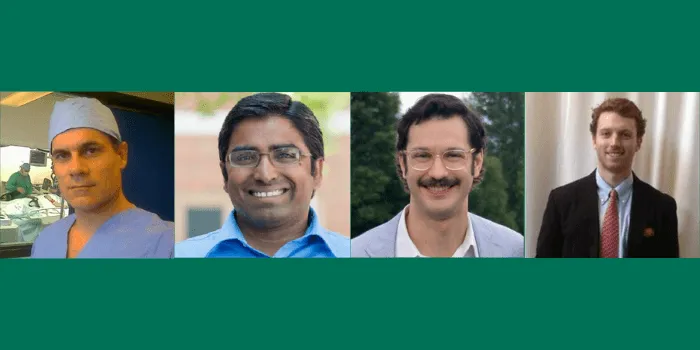Saline is the lifeblood of healthcare delivery in the world, but manufacturing shortages and monopolies threaten communities, healthcare facilities and hospitals that do not have saline security.
By 2026, the medical grade saline market is expected to reach $3.7 billion, making for ideal timing to license the patent rights from UVM to create a new spinoff company. Secure Surgical Solutions (SSS, LLC) banks on the technology of three UVM faculty members—assistant professors Raju Badireddy and Richard Grunett, plus researcher Logan Werner—along with Professor David Sobel of Brown University to deliver a groundbreaking medical product that not only helps patients, but also protects the environment. Now, it’s earned the attention of the National Science Foundation’s Small Business Technology Transfer (SSTR) program, too.
The team is committed to the development of onsite, point of care production of a surgical saline from local and marginal water resources, as they explain in a March 2021 report. “This team developed a novel, patented process of fouling mitigation for forward osmotic membranes,” they write. “This technology is a new platform that can be applied in numerous environments and industries to extract water from multiple applications including chemical processing, mining operations, agricultural field runoff, food processing, and aeronautical applications.”
Recently, the National Science Foundation invited Secure Surgical Solutions to submit a SSTR Phase 1 proposal—a chance to be part of a program that focuses on funneling scientific inventions into potential products and services for the commercial world and communities in need. “Unlike fundamental or basic research activities that focus on scientific and engineering discovery itself,” explains the National Science Foundation, “the NSF STTR program supports the creation of opportunities to move fundamental science and engineering out of the lab and into the market or other use at scale, or startups and small businesses representing ‘deep technology ventures.’”
‘Saline Reliance into Saline Resilience'
Seeing a need for something lightweight, portable, and able to draw on local resources, the UVM professors invented a product unlike any other on the market today. Currently, only a few large companies produce medical grade saline, which is heavy (more than 8 pounds per gallon) with expensive shipping costs. The SSS device, meanwhile, is small, solar or battery-powered, and can use just salt and marginal water to produce medical grade saline onsite—no shipping needed.
“SSS, LLC will be turning ‘Saline Reliance into Saline Resilience,’” says Dr. Badireddy. “Specifically, our device will enhance saline security—reliable availability of acceptable quality and quantity of saline—for hospitals, communities, NGOs, and countries from transportation barriers of critically needed surgical solutions. We will be turning wastewater into medical grade saline, which is a huge advancement.”
Adds Dr. Grunett about the intention for the invention: “We would like any health care system to have an alternative method of saline procurement using local water sources via a low energy sustainable process. This new platform of water extraction can be individualized to the specific source water and can extract the water simply and safely into sodium chloride or other solute draw solutions, creating an additional water source of the wastewater of many common industrial processes.”
